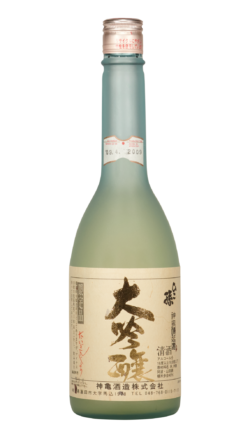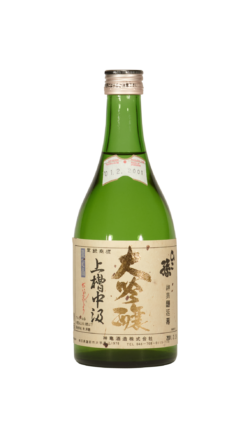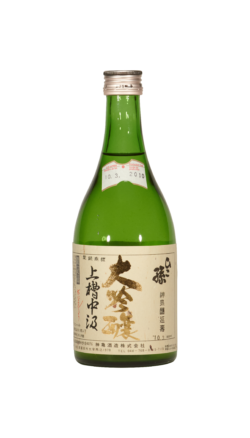Sake Daiginjo
Meaning of words
gin = valeur importante // jo = fermentation // Ginjo=long fermentation // dai = great // Daiginjo = great ginjo
A Daiginjo is therefore a great long-fermented ginjo, great in the sense of "more" at all stages, at all levels.......
Litterally Great Ginjo, sake whose rice has been polished to at least 50% (% of rice remaining after polishing) or less and whose fermentation has been done at a colder temperature so as to have a slower and therefore longer fermentation
before going any further, it must be stressed that the important thing is not the polishing rate, but to reach the heart of the rice.
good producers will often call only 1 or 2 of their sakes Ginjo. the one that is in their eyes their best ginjo, hence great Ginjo = Daiginjo
some ginjo respect the official rules of daiginjo but as they are not the greatest according to their producer, they will simply be Ginjo.
For further information:
« Ginjo et Daiginjo »
Ginjo sakes appeared in the 20th century with industrialisation and the progress of rice polishing techniques. New flavours appeared, more fruity and floral. Daiginjo means great Ginjo, a sort of Grail of purity, by polishing the rice more and more to reach the heart of the grain. The most used rice, the king of rices as it is called, is Yamadanishiki because it has the biggest heart of all the rices, between 35% and 40% of the rice grain, it is important to know that beyond 35%, the heart of this rice becomes homogeneous. It is therefore unnecessary to polish the rice grain further. Below 35%, it is just commercial. Ginjo sake is slowly matured by lowering the temperature to around 7°C during the entire fermentation process, but there are no official rules regarding temperature.
Rules to be respected to have the Ginjo designation:
polishing ratio should be less than 60% polishing (semaibuai), even less than 50% for Daiginjo.
colder fermentation temperature during the moromi stage, which results in a 10-day longer fermentation time. This makes a total of about 33 days.
more gentle pressing.
greater care in the production process at all stages.
for a long time these Daiginjo sakes were not sold to the public, they were only produced for competitions to enhance the brewery's reputation.
Today, brewers often consider their Daiginjo sake as their masterpiece, a kind of ultimate sake.
delicacy and patience characterise the process of making ginjo




